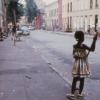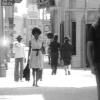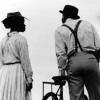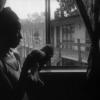You are here
Filmography
Featuring well-known L.A. Rebellion works alongside rarely seen student films, this body of work represents not only the originality of the individuals whose names are on them, but a collective vision as well. Across the two decades during which they made their presence felt at UCLA, and in the decades since, individual L.A. Rebellion artists have focused on diverse topics and responded to evolving political and artistic thought through their work. Explorations of class, considerations of historical legacies, stories attentive to concerns of local communities and appreciations of other Black arts are only some of the areas of exploration. The films also display a diversity of forms, from irreverent reconfigurations of well-worn genre types, to groundbreaking experiments with cinematic language. Certain works, long out of circulation, represent rediscoveries and will certainly lead to much future scholarship.
Learn more about the UCLA Film & Television Archive’s ongoing “L.A. Rebellion” inititiative.
| Title | Year | |
|---|---|---|
 |
Blossoms of Black Seed Denise Bean documents the students of Hamilton High putting on a production of "Blossoms of Black Seed," a musical and dance performance inspired by Black history that was created by their teacher, Fran Atkins. Segments of the performance are interspersed with footage of the students in classroom discussions and rehearsals. |
1976 |
 |
Boat People A Haitian family attempts to escape to the United States in Bernard Nicolas' drama. |
1982 |
 |
Brick by Brick Shirikiana Aina exposes the gentrification of poor Black neighborhoods in late-Seventies Washington D.C. through compelling personal testimony, including participants in the Seaton Street project, in which tenants successfully united to purchase buildings. |
1982 |
 |
Bush Mama Bush Mama is Haile Gerima's powerfully moving look at the realities of inner city poverty and systemic disenfranchisement as experienced by Dorothy, a pregnant welfare recipient in Watts, played by the magnetic Barbara O. Jones. Motivated by the incarceration of her partner T.C. (Weathers) and the protection of her daughter and unborn child, Dorothy undergoes an ideological transformation from apathy to action. |
1975 |
 |
Child of Resistance Inspired by a dream Haile Gerima had after seeing Angela Davis handcuffed on television, Child of Resistance is an abstract and symbolic film that follows a woman imprisoned as a result of her fight for social justice. |
1972 |
 |
Co-Motion: Tales of Breastfeeding Women Zeinabu irene Davis explores contemporary views of breastfeeding through interviews with mothers, fathers and professionals in the field.
|
2010 |
 |
Compensation In two Chicago love stories, set a century apart, a deaf woman and a hearing man face the specter of death in director Zeinabu irene Davis' feature debut. They also confront intraracial differences across lines of gender, class, education and ability. Through innovative use of sign language and title cards evoking the silent film era, Compensation is accessible to deaf and hearing audiences. |
1999 |
 |
Creating a Different Image: Portrait of Alile Sharon Larkin O.Funmilayo Makarah's Creating A Different Image is a jubilant affirmation of self-identity for artist and filmmaker Alile Sharon Larkin. |
1989 |
 |
Cutting Horse Larry Clark’s revisionist Western appropriates and reconfigures genre tropes to tell the emotional story of a man struggling to put things right in his life and in his community. Hired to train horses for competitive events in a town from which he was once exiled, his return gives him a chance at redemption. |
2002 |
 |
Cycles As a woman anxiously awaits her overdue period, she performs African-based rituals of purification in this short by Zeinabu irene Davis. |
1989 |
Pages
To report problems, broken links, or comment on the website, please contact support
Copyright © 2025 UCLA Film & Television Archive. All Rights Reserved






 Mobile Navigation
Mobile Navigation

